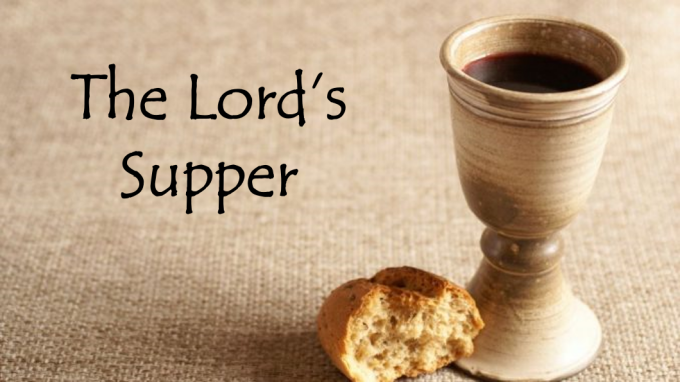Invitations to the Lord's Supper

QUESTION: “When the Lord’s Supper is served at Oakwood, why is the invitation to come to the Lord’s table only offered to those who are ‘members in good standing of a Bible-believing church’?”
ANSWER: The need for elders to be sure that those who come to the Lord’s table make a credible profession of faith is related to two important responsibilities of church leadership: 1.) shepherding care for the congregation; and, 2.) proper church discipline. Paul makes it clear in I Corinthians 11:17-32 that each professing believer is to examine themselves to be sure that their faith is genuine before they partake of the Lord’s Supper. However, does Paul mean that only that individual believer is to be involved in making that discernment?
Let me begin with a personal example. I was raised in a church where children traditionally took a membership class when they reached the age of 13. At the end of that class, it was expected that, unless the young person was resistant, he or she would join the church. Many of us were not truly regenerate when we took our vows. In my case, the Lord didn’t save me until I was 16 years old. That means that I took communion for 3 years “in an unworthy manner”, without “discerning the Lord’s body”. I was accountable for that, but didn’t the church leaders bear some responsibility for not making some attempt to discern if I had a credible profession of faith? Wouldn’t that be a failure in their responsibility to shepherd the flock?
You may rightly ask, “Where in Scripture does it give the elders the responsibility to attempt to discern the genuineness of a person’s faith?” First of all, I believe that Jesus implies it when he says about false teachers, “…you will recognize them by their fruits” (Matthew 7:15-20). This is only a few verses after He says, “Judge not, that you not be judged.” In other words, we must not pridefully condemn or reject others, but there is a humble and righteous sense in which all believers must seek to discern if a person’s words and deeds give evidence of true faith. This is a necessity for protecting the church from false teaching and sinful lifestyles.
If every believer must be able to discern the fruit of a person’s profession of faith, then how much more responsibility do the leaders of the church have? It is their responsibility to guard the truth and purity of the church, in submission to the Word of God. This is the whole basis for church discipline. Matthew 18 describes, in general terms, the whole discipline process, including initial appeals for repentance. In I Corinthians 5:1-13, we see the final stage of that process. Paul chastises the Christians at Corinth for not breaking fellowship with a man who was living in open, unrepentant sin. He tells them not to associate with this professing believer, and specifically says that they are “not even to eat with such a one.” Most commentators agree that Paul is referring to communion there, especially since he speaks of celebrating the Passover in the verses which immediately precede that exhortation. The Lord’s Supper is the New Covenant fulfillment of the Passover celebration.
If elders do not have the responsibility to discern whether or not a professing believer has a credible profession of faith, then the concepts of church membership and church discipline are meaningless. To welcome a new member into a church is to acknowledge their right in Christ to share in the privileges and responsibilities of church membership, especially to come to His table. To fully discipline a member who lives in ongoing, open, and unrepentant sin means to withdraw those benefits in Christ’s name and “deliver this man to Satan for the destruction of the flesh, so that his spirit may be saved in the day of the Lord.” (I Corinthians 5:5; Cf., I Timothy 1:20). Paul also says that, after the excommunication, we are to treat that this person as a brother, not an enemy. So we aren’t to shun them – they can attend services, but they shouldn’t be allowed to come to the Lord’s table until they’ve given evidence of true repentance. After all, the term “ex-communication” means to bar someone from the table, not from the church building.
We do not see the interviews with potential members or those who just want to come to the Lord’s table as any kind of “inquisition”. Quite to the contrary, we look forward to those times as opportunities to hear wonderful stories of God’s grace at work in the life of sinners like us. These are some of the most encouraging times in all of our meetings. On the rare occasion where someone is not able to give a clear testimony to saving faith in Christ, it usually becomes a great ministry opportunity as we seek to share the true Gospel of Christ with them.
We, as church leaders, have no desire to put up any obstacles to keep true, repentant believers from coming to celebrate their salvation and relationship with Christ at His table. Requiring to people to give a clear testimony for Christ seems like the least we can do to fulfill our shepherding responsibilities as leaders. Consider that the Lord’s table would become a meaningless ritual if it were left up to only the individual to determine whether or not their faith in Christ was Biblical and genuine. Many cult members claim to follow Christ. Many liberal Christians who deny the deity and resurrection of Christ still claim to follow Him. Many professing believers living in scandalous sins have no qualms about participating in the Lord’s Supper. It is the responsibility of the elders of the church to guard the purity of the Lord’s table and to keep these undiscerning worshippers from eating and drinking judgment on themselves (I Corinthians 11:29).
